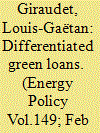|
|
|
Sort Order |
|
|
|
Items / Page
|
|
|
|
|
|
|
| Srl | Item |
| 1 |
ID:
177379


|
|
|
|
|
| Summary/Abstract |
Scaling up home energy retrofits requires that associated loans be priced efficiently. Using a unique dataset of posted loan prices scraped from online simulators made available by French credit institutions, we examine the differentiation of interest rates in relation to project risk. Crucially, our data are immune from sorting bias based on borrower characteristics. We find that greener, arguably less risky, automobile projects carry lower interest rates, but greener home retrofits do not. On the other hand, conventional automobiles carry lower interest rates than do conventional home retrofits, despite arguably similar risk. Our results are robust to a range of robustness checks, including placebo tests. They together suggest that lenders use underlying assets to screen borrower's unobserved willingness to pay, which can cause under-investment in home energy retrofits. We thereby point to a new form of the energy efficiency gap. This has important policy implications in that it can explain low uptake of zero-interest green loan programs.
|
|
|
|
|
|
|
|
|
|
|
|
|
|
|
|
| 2 |
ID:
177432


|
|
|
|
|
| Summary/Abstract |
Energy demand for residential heating is targeted in France by a number of subsidy programmes (tax credits, zero-interest loans, reduced VAT, white certificates) and the carbon tax. We assess the cost-effectiveness and distributional impacts of these policies using Res-IRF, an energy-economy model that integrates relevant economic, behavioural and technological processes. We find that, without further specification of revenue recycling, the carbon tax is the most effective, yet most regressive, policy. Subsidy programmes save energy at a cost of €0.05–0.08 per lifetime discounted kilowatt-hour, or €300–800/tCO2-eq; one euro of public money spent on subsidy programmes induces €1.0–1.4 private investment in home energy retrofits. Targeting subsidies towards low-income households, who tend to live in energy inefficient dwellings, increases leverage, thus reconciling economic efficiency and equity. The public cost of subsidies – €3 billion in 2013 – is outweighed by carbon tax proceeds from 2025 onwards, were the tax rate to grow as initially planned by the government. Meeting the long-term energy saving targets set by the government however requires adjusting subsidy programmes to better address rental housing. Lastly, an order-of-magnitude discrepancy between simulated and observed numbers of zero-interest loans points to economic and psychological barriers that require further investigation.
|
|
|
|
|
|
|
|
|
|
|
|
|
|
|
|
|
|
|
|
|